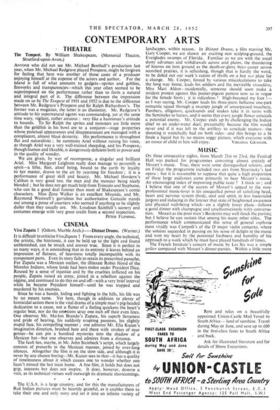CINEMA
Viva Zapata ! (Odeon, Marble Arch.)—Distant Drums. (Warner.)
Fr is difficult to criticise VivaZapata ! From every angle, the technical, the artistic, the histrionic, it can be held up to the light and found unblemished, can be struck and answer true. Since it is perfect in so many ways, it is astonishing that in its entirety it leaves behind an impression of flatness, of heaviness totally incompatible with its component parts. Even its story fails to retain its prescribed panache. For Zapata was a Mexican outlaw, the illiterate Robin Hood of the Morelos Indians, whose lands had been stolen under President Diaz. Roused by a sense of injustice and by the cruelties inflicted on his people, Zapata raised an army, joined in a rebellion against the regime, and continued to do this on and off—with a very brief interval while he became President himself—until he was trapped and murdered by his enemies.
Since he was a bandit, hiding and fighting in the hills, his life was by no means tame. Yet here, though in- addition to plenty of homicidal action there is the vital drama of a simple man's pig-headed dedication to a cause, not a flutter of a feeling quickens the heart's regular beat, nor do the emetions stray one inch off their even lines. One observes Mr. Marlon Brando's Zapata, his superb fierceness and pride of bearing, his suddenly erupting passions, his slightly stupid face, his compelling manner ; one admires 'Mr. Elia Kazan's imaginative direction, brushed here and there with strokes of near genius—he can pin a hundred mysteries into the shadow of a Mexican hat—but one observes and admires from a distance.
The fault lies, maybe, in Mr. John Steinbeck's script, which largely consists of proverbs in the Mexican manner, joined by over-long silences. Altogether the film is on the slow side, and although it is never by any chance boring—Mr. Kazan sees to that—it has a quality of timelessness about it which causes one to wonder whether one hasn't missed the last train home. A fine film, it holds but does not grip, interests but does not inspire. It does, however, deserve a visit, as its technical virtues well outweigh its dramatic shortcomings.
The U.S.A. is a large country, and for this the manufacturers of Red Indian pictures must be heartily grateful, as it enables them to take their one and only story and set it into an infinite variety of
landscapes, within reason. In Distant Drums, a film starring Mr. Gary Cooper, we are shown an exciting new scalping-ground, the Everglades swamps of Florida. Familiar as we are with the usual dusty advances and withdrawals across arid plains, the thundering of hooves on iron ground as the death-or-glory boys career across scorched prairies, it is refreshing, though that is hardly the word, to be doled out our week's ration of thrills on a hot net plate for a change. Mr. Cooper, forced by various miscalculations to take the long way home, leads his soldiers and the inevitable vivandiere, Miss Mari Aldon—incidentally, someone should soon make a strident protest against this pouter-pigeon pattern now so in vogue for the female form ; it is ridiculous ! High-breasted my foot !- as I was saying, Mr. Cooper leads his three-parts bellicose one-part romantic squad through a swampy jungle of unsurpassed treachery. Panthers, alligators, quicksands and snakes take it in turns with the Seminoles to harass, and it seems that every jungle flower conceals a potential enemy. Mr. Cooper ends up by challenging the Indian chief to an under-water duel, presumably because the film would never end if it was left to the artillery to conclude matters—the shooting is wretchedly bad on both sides—and this brings to a fit finale a liquid but by no means soggy picture, which everyone with


































 Previous page
Previous page